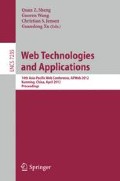Abstract
Large social networks (e.g. Twitter, Digg and LinkedIn), have successfully facilitated information diffusion related to various topics. Typically, each topic discussed in these networks is associated with a group of members who have generated content on it and these users form a topic community. Tracking topic community is of much importance to predict the trend of hot spots and public opinion. In this paper, we formally define the problem of topic community tracking as a two-step task, including topic interest modeling and topic evolution mining. We proposed a topic community tracking model to model user’s interest on a topic which is based on random walk algorithm and combines user’s personal affinity and social influence. And then, considering that user’s interest on a topic will vary with time when the discussion content changes and new topic community member joins in, we explore an Adaptive Topic Community Tracking Model. Comprehensive experimental studies on Digg and Sina Weibo corpus show that our approach outperforms existing ones and well matches the practice.
Access this chapter
Tax calculation will be finalised at checkout
Purchases are for personal use only
Preview
Unable to display preview. Download preview PDF.
References
Cha, M., Mislove, A., Grummadi, K.P.: A measurement-driven analysis of information propagation in the flickr social network. In: ACM WWW (2009)
Liu, L., Tang, J., Han, J., Jiang, M., Yang, S.: Mining topic-level influence in heterogeneous networks. In: Proceedings of the 19th ACM International Conference on Information and Knowledge Management, pp. 199–208. ACM (2010)
Agarwal, N., Liu, H., Tang, L., Yu, P.: Identifying the influential bloggers in a community. In: Proceedings of the International Conference on Web Search and Web Data Mining, pp. 207–218. ACM (2008)
Faloutsos, M., Faloutsos, P., Faloutsos, C.: On power-law relationships of the internet topology. In: SIGCOMM 1999, pp. 251–262 (1999)
Dretske, F.: Explaining behavior: Reasons in a world of causes. The MIT Press (1991)
Rosen-Zvi, M., Griffiths, T., Steyvers, M., Smyth, P.: The authortopic model for authors and documents. In: Proceedings of the 20th Conference on Uncertainty in Artificial Intelligence, pp. 487–494. AUAI Press (2004)
Hofmann, T.: Probabilistic latent semantic analysis. In: Proc. of Uncertainty in Artificial Intelligence, UAI 1999, p. 21. Citeseer (1999)
Langville, A., Meyer, C.: Deeper inside pagerank. Internet Mathematics 1(3), 335–380 (2004)
Lovasz, L.: Random walks on graphs: A survey. Combinatorics, Paul Erdos is Eighty 2(1), 1–46 (1993)
Newman, M.E.J.: Fast algorithm for detecting community structure in networks. Physical Review E 69 (2004)
Tseng, B.L., Tatemura, J., Wu, Y.: Tomographic Clustering To Visualize Blog Communities as Mountain Views, Chiba, Japan, May 10-14 (2005)
Adamic, L., Adar, E.: Friends and neighbors on the web. Social Networks 25(3), 211–230 (2003)
Steyvers, M., Griffiths, T.: Probabilistic topic models. Handbook of latent semantic analysis, vol. 427 (2007)
Gilbert, E., Karahalios, K.: Predicting tie strength with social media. In: Proceedings of the 27th International Conference on Human Factors in Computing Systems, pp. 211–220. ACM (2009)
Tan, P.N., Steinbach, M., Kumar, V., et al.: Introduction to data mining. Pearson Addison Wesley, Boston (2006)
Author information
Authors and Affiliations
Editor information
Editors and Affiliations
Rights and permissions
Copyright information
© 2012 Springer-Verlag Berlin Heidelberg
About this paper
Cite this paper
Liang, Z., Jia, Y., Zhou, B. (2012). Adaptive Topic Community Tracking in Social Network. In: Sheng, Q.Z., Wang, G., Jensen, C.S., Xu, G. (eds) Web Technologies and Applications. APWeb 2012. Lecture Notes in Computer Science, vol 7235. Springer, Berlin, Heidelberg. https://doi.org/10.1007/978-3-642-29253-8_41
Download citation
DOI: https://doi.org/10.1007/978-3-642-29253-8_41
Publisher Name: Springer, Berlin, Heidelberg
Print ISBN: 978-3-642-29252-1
Online ISBN: 978-3-642-29253-8
eBook Packages: Computer ScienceComputer Science (R0)

